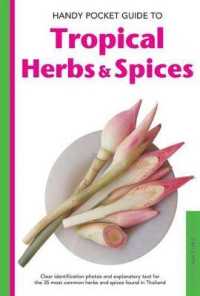Full Description
Johannes Brahms was a consummate professional musician, and a successful pianist, conductor, music director, editor and composer. Yet he also faithfully championed the world of private music-making, creating many works and arrangements for enjoyment in the home by amateurs. This collection explores Brahms' public and private musical identities from various angles: the original works he wrote with amateurs in mind; his approach to creating piano arrangements of not only his own, but also other composers' works; his relationships with his arrangers; the deeper symbolism and lasting legacy of private music-making in his day; and a hitherto unpublished memoir which evokes his Viennese social world. Using Brahms as their focus point, the contributors trace the overlapping worlds of public and private music-making in the nineteenth century, discussing the boundaries between the composer's professional identity and his lifelong engagement with amateur music-making.
Contents
Foreword Michael Musgrave; 1. Brahms in the home: an introduction Katy Hamilton and Natasha Loges; 2. The Joachim quartet concerts at the Berlin Sing-Akademie: Mendelssohnian Geselligkeit in Wilhelmine Germany Robert Eshbach; 3. Domesticity in Brahms's string sextets, Opp. 18 and 36 Marie Sumner Lott; 4. Where was the home of Brahms's piano works? Katrin Eich; 5. Main and shadowy existence(s): works and arrangements in the oeuvre of Johannes Brahms Michael Struck; 6. Brahms arranges his symphonies Robert Pascall; 7. At the piano with Joseph and Johannes: Joachim's overtures in Brahms's circle Valerie Woodring Goertzen; 8. Brahms and his arrangers Helen Paskins, Katy Hamilton and Natasha Loges; 9. Brahms in the Wittgenstein homes: a memoir and letters Styra Avins; 10. The construction of gender and mores in Brahms's Mädchenlieder Heather Platt; 11. Music inside the home and outside the box: Brahms's vocal quartets in context Katy Hamilton; 12. The limits of the Lied: Brahms's Magelone-Romanzen Op. 33 Natasha Loges; 13. Being (like) Brahms: emulation and ideology in late nineteenth-century Hausmusik Markus Böggemann; 14. The cultural dialectics of chamber music: Adorno and the visual-acoustic imaginary of Bildung Richard Leppert.





